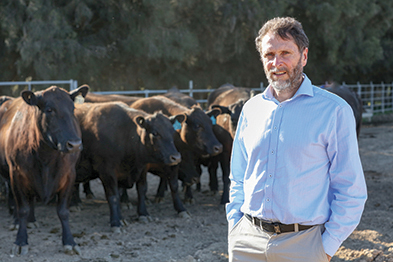Building better cattle from the genes up

Professor John Williams at the Roseworthy campus The new J.S. Davies Research Professor, John Williams, has a distinguished career in the genetic improvement of livestock animals for agricultural production. His background is in ruminant research – cows, sheep, goats and buffalo – with a particular area of expertise in cattle. But it almost didn’t end up that way.
When he left secondary school to study at King’s College London, Professor Williams’ first love was physics. “I knew I wanted to be a scientist but as I got further into my studies I realised I was developing a stronger interest in biology,” he says. This culminated in dual Honours of physics and biology.
Inspired by his experiences at King’s with Nobel Laureate Maurice Wilkins, Professor Williams undertook a PhD in Biochemistry at the National Institute for Medical Research, London. After studying gene expression in the aquatic frog species Xenopus, he then moved to the University of Edinburgh to work with Drosophila fruit flies. Professor Williams found his expertise in the underlying genetics of animal disease leading him to agricultural science.
He moved to the Roslin Institute in 1986 to work on tropical diseases and spent a period working on secondment in Kenya. At Roslin, Professor Williams was Head of the Cattle Blood Typing Service and Head of the Bovine Genomics Section. Then in 2005 he took on a short-term contract at the Parco Tecnologico Padano in Italy – but stayed as Science Director for almost 10 years, where he was involved in establishing a start-up diagnostics company.
“Much of my career has been spent working in agricultural research organisations that have started small but have grown substantially. At the Roslin Institute, their animal breeding programs were initially focused on traditional genetics, but we expanded that to cover molecular biology and genomics, and I was involved in translating this into services for industry. I had a similar experience at Parco Tecnologico Padano, which grew to have an international research impact,” Professor Williams says.
He sees his new role in the University’s School of Animal and Veterinary Sciences as in keeping with these past experiences. “I’m very excited about being here at the University, at a time when we’re looking to establish the J.S. Davies Animal Research Centre.
“To be building on the outstanding work that’s already been conducted at the Roseworthy campus, and helping it to develop, is a great opportunity,” he says.
|



